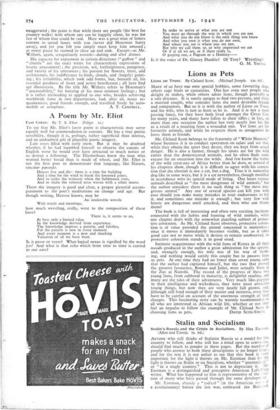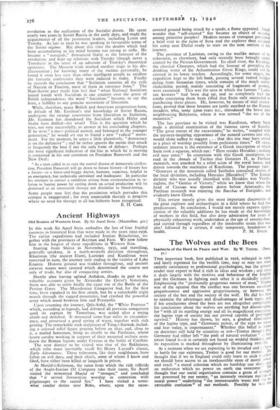Stalin and Socialism
Stalin's Russia and the Crisis in Socialism. By Max Eastman. (Allen and Unwin. 7s. 6d.) ANYONE who still thinks of Stalinist Russia as a model for this country to follow, and who still has a mind open to conviction, should find much to ponder in these pages. But the number of people who answer to both these descriptions is no longer large; and for the rest it is not unfair to say that this book is more important for the light it throws on Mr. Eastman than for the light it throws on Stalin or on Socialism, whether " international or "in a single country." This is not to depreciate it. Eastman is a distinguished and perceptive American Left-V, ing writer. What has happened to him is representative of the :=ac- tion of many who have passed through the same developincnr- Mr. Eastman, already a " radical " (in the American sera-' a revolutionary) before the last war, embraced the Bols,-..:4
revolution as the realisation of the Socialist dream. He spent nearly two years in Soviet Russia in the early days, and made the acquaintance of all the prominent leaders, including Lenin and Trotsky. As late as 193o he was speaking in favourable terms of the Soviet regime. But about this time the doubts which had been accumulating in his mind became too strong to stifle. He became a " renegade," denounced Stalin as the betrayer of the revolution, and kept up relations with Trotsky (though never a Trotskyist in the sense of an adherent of Trotsky's theoretical opinions). The Moscow trials marked another stage in his dis- illusionment ; for knowing many of the victims personally, he found it even less easy than other intelligent people to swallow the fantastic confessions they were induced to make. Finally he records the conclusion that " Stalinism contains all the evils of Nazism or Fascism, most of them in extremer form." The Nazi-Soviet pact made him feel that " when National Socialism joined hands with Socialism in one country over the grave of Polish independence, the word " Socialism " became, to say the least, a liability to any genuine movement of liberation.
While, therefore, many British and American progressives have, in default of Mr. Eastman's real knowledge of Soviet Russia, undergone the strange conversion from liberalism to Stalinism, Mr. Eastman has abandoned the Socialism which Hitler and Stalin have defiled—for what? This is the question which he tries, not very successfully, to answer in his concluding chapters. If he were " a more political animal, and belonged to the younger generation," he would set out to found a new " radical " move- ment. For the moment, he urges a little plaintively, "democracy is on the defensive " ; and he rather ignores the motto that attack is frequently the best if not the only form of defence. Perhaps the most significant indication of the line in which he is moving is contained in his one comment on President Roosevelt and the New Deal:
" As a man called in to cure the mortal disease of democratic civilisa- tion, President Roosevelt will go down to future history—if history has a future—as a horse-and-buggy doctor, humane, sagacious, helpful in an emergency, but technically untrained and inadequate. In particular his attempts to correct a condition arising from overproduction in re- lation to buying power by cutting down on actual production will be dismissed as an amateurish therapy not dissimilar to blood-letting.
Some people may feel that the pessimism which pervades this critique is exaggerated ; for even amateurish therapy is progress where no need for therapy at all has hitherto been recognised.
E. H. CARR.



























 Previous page
Previous page